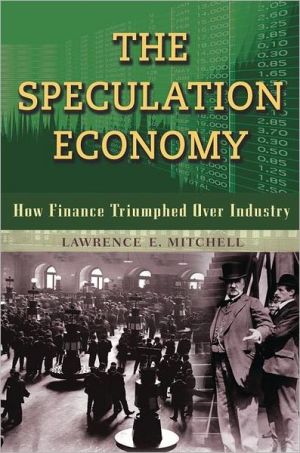

 |

|

The average rating for The Speculation Economy: How Finance Triumphed over Industry based on 2 reviews is 4.5 stars.
Review # 1 was written on 2008-01-02 00:00:00 Rajan IYER Rajan IYERLawrence Mitchell provides an excellent chronicle of the events between 1897 and 1919 when our corporate landscape shifted from independent factories, controlled by entrepreneurs, to one driven by financiers, promoters, and business managers focused on stock price. He breaks the history of this important shift into three rough phases: (1) Antitrust reform proposals and the federal incorporation movement tried to compel corporate disclosure of financial information to reveal the true value of corporate capitalizations. The merger wave of 1897-1903 brought middle-class Americans to the market. (2) Antispeculation drove efforts to maintain the safety of banks and the national economy. 1903-1914 saw steadily increasing investments in common stock, as well as bonds and high quality industrials/railroads by a growing middle class. (3) Consumer protection treats investors like consumers, seeking to provide information to individual investors so they can make self-reliant, informed investment decisions. Common stock overtakes bonds as the investment of choice in the 1920s. The stock market took the place of our fabled frontier for the middle class, which hopes to strike it rich by speculating on stock. Financiers profit, whether industrial profits are high or nonexistent. In the past, the typical stockowner "gave at least as much attention to the asset value behind the shares as he did to their earnings records," according to Graham and Dodd. Now buyers care more about price trends, reputations and rumors. Regulation, as it evolved, is of little use to the actual shareowner because it is focused on the disclosure of the terms sale, rather then the details of governance... due diligence in purchase, not in ongoing operations. The result is less of an emphasis by investors on fundamental value and more of an emphasis on expectations that are built upon the expectations of others... behavioral economics and the tea leaf reading of "technical analysts." "The natural response is for management to do what it has to do in order to meet the market's expectations, no matter how unrealistic those expectations may be." CEOs face "irresistible incentives to maximize stock prices at almost any cost to the corporation's long-term health." The strength of our economy, the health of our people and planet, may depend on our ability to take a longer-term multigenerational assessment of our welfare. Corporate governance is no longer a private atomistic matter. Mitchell's contribution to our understanding of how and why we took this deadly path may help us find a better route to a more sustainable future. |
Review # 2 was written on 2010-02-22 00:00:00 Dan Skroch Dan SkrochFascinating story about America's obsession with the stock market Scholar Lawrence E. Mitchell makes his case about the speculative nature of the American economy in a complex, highly annotated volume. His detailed presentation explores historic, social, academic, legal and regulatory forces that shaped financial capitalism, especially in the late 1800s and the early 1900s. He depicts an American infatuation with speculative stock market investments and describes efforts by the federal government to nurture stock appreciation and provide regulatory protections for the average investor. getAbstract recommends this slice of financial history to readers interested in the early turning points that shaped modern American capitalism. |
CAN'T FIND WHAT YOU'RE LOOKING FOR? CLICK HERE!!!